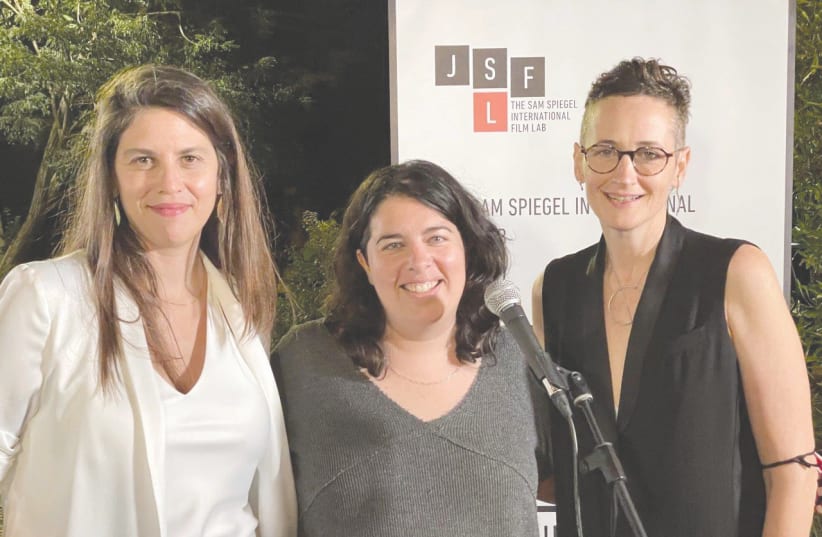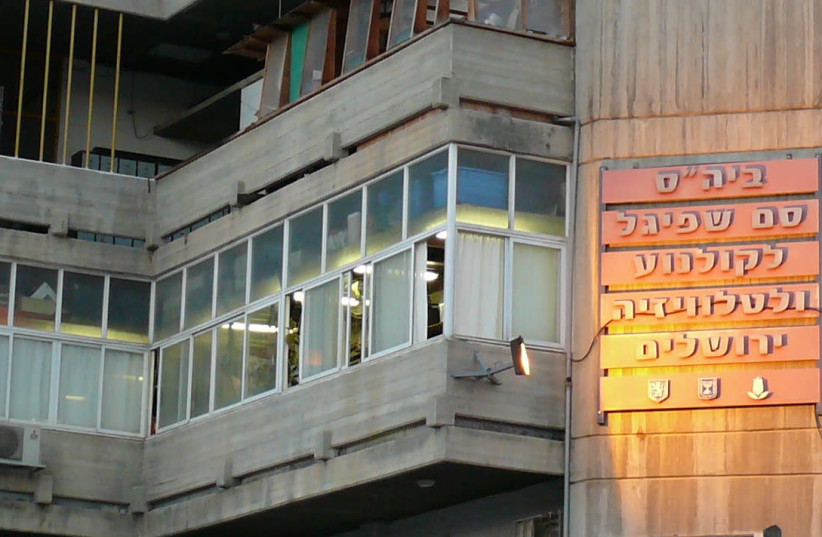As the Jerusalem Sam Spiegel International Film Lab prepares to launch its 10th edition, it has unquestionably become a powerhouse in world cinema.
The Lab is a program where six Israelis and six foreign participants developing their first or second narrative feature films collaborate with a mentor – a distinguished director/screenwriter, some of whom are Israeli and others who come from abroad – over a period of nine months to get their films ready to be financed and produced.
Speaking in an interview at the Jerusalem Sam Spiegel Film School, located on a street in the Talpiot industrial area that was renamed Sam Spiegel Alley a number of years ago, Lab director Aurit Zamir said, “Within 10 years of its founding, the Lab has become a major player in feature film development.”
There is no question that this is the case in the realm of serious art-house filmmaking. Whenever an international film festival announces its lineup these days, there are two or three – sometimes more – movies that were either developed in the Lab or are by directors who made their early films at the Lab. In the first nine editions, 91 films, from over 45 countries were developed. According to Zamir, over 50% of these were produced and more than 75% of those were shown at major film festivals. “The Lab has launched careers,” she said.
Zamir, a successful Israeli film and television producer, whose credits include Ruthy Pribar’s Asia and the TV series, The Missing File, came to the Lab last year. The Lab is run by the Jerusalem Sam Spiegel Film School, which was founded Renen Schorr in 1989.
“The success of the Lab, which brings together Israelis and filmmakers from around the world, shows how much Sam Spiegel has become a center for international filmmaking,” she said.
The Lab’s highest-profile success story to date was Hungarian director László Nemes’s 2015 film, Son of Saul, a realistically told story of the Sonderkomando at Auschwitz, which won the Oscar for Best Foreign Language Film and the Grand Prize of the Jury at the Cannes Film Festival. Recently, Murina by the Croatian director Antoneta Alamat Kusijanović, won the Camera d’Or Prize at this year’s Cannes Film Festival, an award for a debut film. The movie Anatolian Leopard, by Turkish director Emre Kayis won the FIPRESCI Award at the Toronto International Film Festival in 2021, a prize given by international film journalists. Brighton 4th by Levan Koguashvili of Georgia, won the Best International Narrative Feature Award and several others at the 2021 Tribeca Film Festival. Dea Kulumbegashvili’s Beginning, a Georgian-French film, was accepted to Cannes in 2020, although that festival did not take place, and went on to win major awards at the Toronto International Film Festival and the San Sebastian International Film Festival in 2020.
“These wins were all an incredible honor,” said Zamir.
DOZENS OF other films from the Lab have been shown at film festivals around the world, many of them winning important awards. Those shown at Cannes include The Kindergarten Teacher (which was remade in the US in a version starring Maggie Gyllenhaal) by Israeli director, Nadav Lapid, whose latest film, Ahed’s Knee won the Cannes Jury Prize this year; Run by Philippe Lacôte of the Ivory Coast; and One Week and a Day, by Asaph Polonsky, also an Israeli director. At Berlinale, the Berlin International Film Festival, movies developed in the Lab include The Black Frost by Maximiliano Schonfeld of Argentina. Imperial Dreams by American director, Malik Vitthal, which starred John Boyega of Star Wars, won the Audience Award at Sundance.
This partial list “gives an idea of the reach of the Lab.” Every year’s participants from abroad “are balanced from different areas of the world.” Participants in past editions and the upcoming Lab have come from all over the world, including India, Malta, Cyprus, Colombia, Sri Lanka, Germany, Chile, Finland, Malaysia, Greece, Slovakia, Japan and France.
“We have scouts who are always looking for talents from new territories,” said Zamir. While there is an open call for Israelis to apply for each year’s Lab, which is open to all, not exclusively to Sam Spiegel School graduates, participants from abroad are found by scouts who look at short films at festivals and film schools and seek filmmakers with a script that is just at the right moment for the Lab. “Having participants from all parts of the world really creates a multicultural discourse and a creative community. Everybody brings something different and it creates a unique artistic collaboration.”
But of course, the coronavirus pandemic interfered with the usual operations of the Lab, as it has disrupted virtually every aspect of life. Last year’s Lab went ahead, in spite of COVID-19, but it was online. The 10th Lab will be a hybrid event. Pre-pandemic, the Lab participants would have an initial meeting with their mentors and then two additional week-long meetings in Jerusalem, followed by a final celebratory meeting and a pitching event. “We took advantage of the pandemic to add a fourth meeting,” said Zamir. “We were happy to learn that a lot of the work can be done online, in the same uncompromising standard the Lab is known for.”
She also took the opportunity to add master classes with acclaimed directors, including American directors Eliza Hittman (Never, Rarely, Sometimes, Always) and Debra Granik (Leave No Trace) and Hollywood-based Israeli director, Alma Harel (Honey Boy).
Prizes totaling $80,000 (NIS 257,800) were awarded to exceptional projects, as selected by an international jury headed by Frederic Boyer, artistic director of Tribeca Film Festival.
This year, all prizes went to female directors: Oxygen by Netalie Braun of Israel, and a prize for Emerging Filmmaker was split between Myrsini Aristidou of Cyprus for the film, Iris, and Marianna Brennand Fortes of Brazil for Sisters, three prizes given by the Beracha Foundation. A new award, the FACTORY 54 Artistic Vision Award, was given to Seven Chapters in Survival by Odeya Rosenak of Israel.
At the in-person event the lab participants present their projects to producers and other film professionals, in an event watched by industry members around the world online. The Lab is supported by the Jerusalem Municipality, the Beracha Foundation, Mifal Hapayis, the Jerusalem Development Authority, the Jerusalem Film Fund, the Sam Spiegel Foundation, the Ministry of Culture, the Israel Film Fund and FACTORY 54.
“Our goal is for all the members of each year’s group to make the best film they can possibly make,” said Zamir. “We believe in the necessity of stories, and are intent on supporting the people who tell them.”

